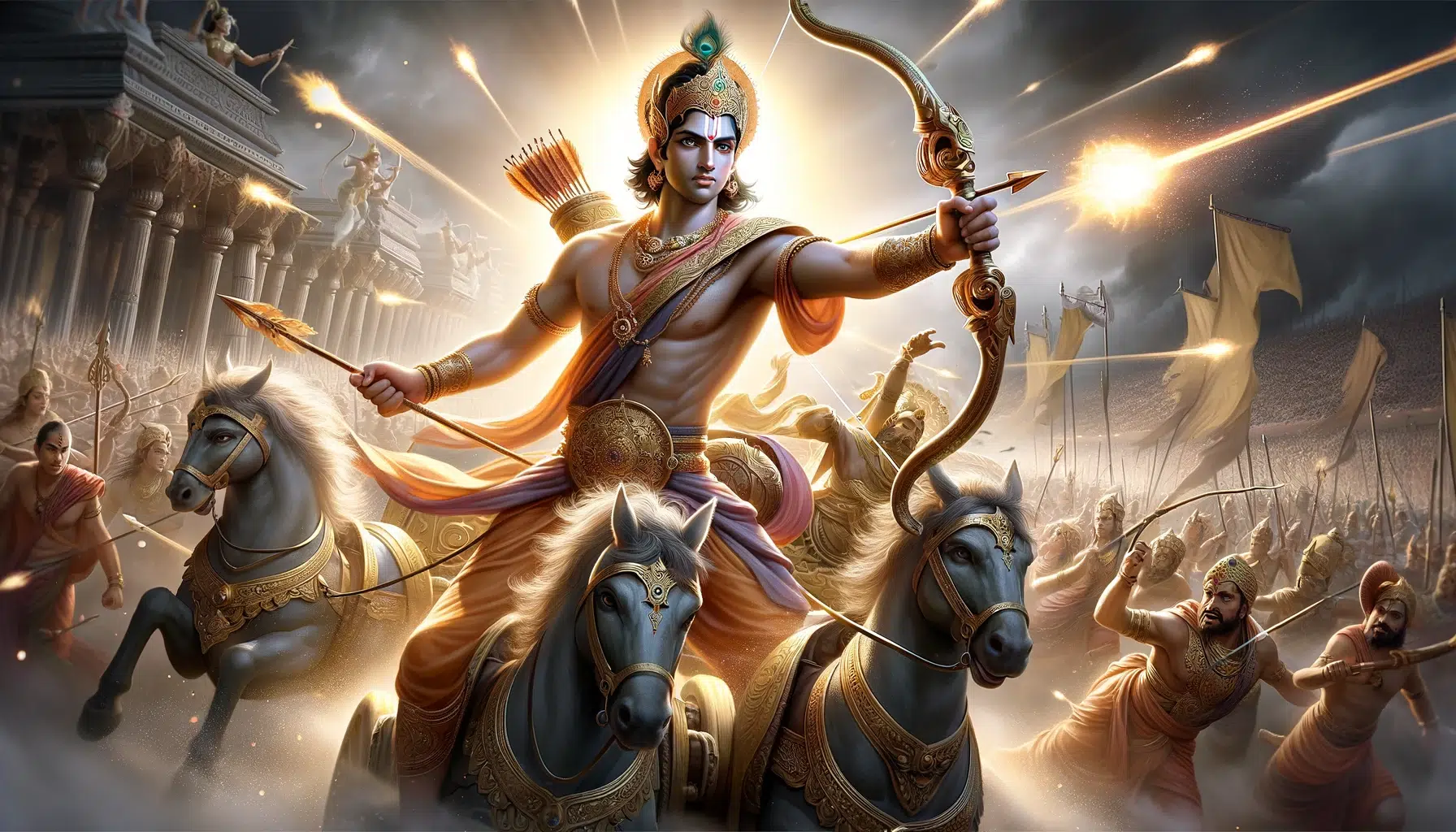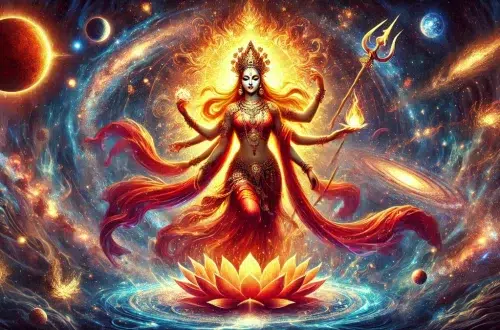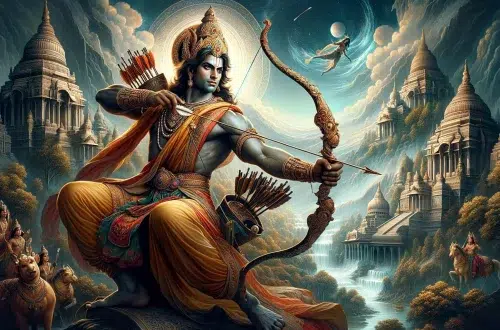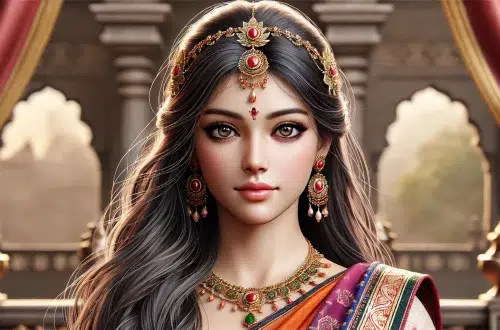
Arjuna: Greatest Archer of the Mahabharata
Arjuna stands on a battlefield facing his own family. His bow is ready. His hands tremble. He does not want to fight.
Arjuna is one of the greatest heroes in the Mahabharata, the epic of ancient India. He is a prince of the Pandava family, a master archer, and a central figure in the Kurukshetra War.
But Arjuna is not remembered for skill alone.
He is the warrior who questioned war itself.
Quick Facts About Arjuna
Epic: Mahabharata
Role: Pandava prince and master archer
Divine Father: Indra
Guide: Lord Krishna
Key Moment: The Bhagavad Gita
Famous Weapon: Gandiva bow
Who Is Arjuna in Indian Mythology?
Arjuna is the third of the five Pandava brothers, sons of King Pandu and Queen Kunti. Trained by the great teacher Dronacharya, he becomes the most skilled archer of his era. His focus, discipline, and accuracy set him apart from all other warriors.
He is also known by many names. Partha, son of Pritha. Kaunteya, son of Kunti. Dhananjaya, conqueror of wealth. Savyasachi, master of archery with both hands. Each name reflects a different strength.
Yet Arjuna’s importance goes beyond battle.
On the eve of war, he faces a moral crisis. Standing between two armies, he sees teachers, cousins, and friends on both sides. He lowers his bow and refuses to fight.
In that moment, Lord Krishna becomes his guide. Their dialogue forms the Bhagavad Gita, one of the most influential spiritual texts in history. Through this teaching, Arjuna learns about duty, righteousness, and inner balance.
Arjuna represents courage, skill, and doubt. He is powerful, yet deeply human. His struggle between duty and emotion is what makes him timeless.
Arjuna’s Family and the Pandava Brothers
Arjuna is the third son of Queen Kunti and King Pandu. He is one of the five Pandava brothers, princes of the Kuru dynasty.
Because King Pandu is cursed and unable to father children, Kunti uses a sacred mantra to call upon the gods. Indra, king of the heavens, answers her prayer. Through him, Arjuna is born with divine strength, courage, and skill.
This divine connection shapes his destiny. As the son of Indra, Arjuna is linked to storms, power, and leadership.
The Pandavas grow up facing hardship. After Pandu withdraws from the throne, the family spends years in exile. Despite this, the brothers receive royal training and education. Their unity becomes their greatest strength.
Arjuna stands out early. He shows focus, discipline, and natural talent. Under the guidance of Dronacharya, he trains relentlessly and quickly surpasses other students.
His bond with his brothers defines him. They rely on each other in exile, rivalry, and war. This loyalty becomes central to the Mahabharata’s conflict.
Arjuna is not just a warrior. He is a son of gods, a prince in exile, and a brother bound by duty.
The Wives of Arjuna

Arjuna marries several women during his life, and each marriage strengthens political alliances and expands his legacy.
Draupadi, shared wife of the Pandavas, becomes a central figure in the epic. Through her, Arjuna has a son named Srutakarma. Draupadi’s humiliation in court later fuels the great war.
Subhadra, sister of Krishna, becomes Arjuna’s beloved wife. Their son, Abhimanyu, grows into a brave warrior who plays a tragic role in the Kurukshetra War.
During exile, Arjuna also marries Ulupi, a Naga princess, and Chitrangada, a princess of Manipur. Through them, he fathers Iravan and Babhruvahana.
These marriages extend Arjuna’s influence across kingdoms and cultures. His children continue his legacy, though many face tragic ends in war.
Training Under Dronacharya
Arjuna trains under Dronacharya, the royal teacher of the Kuru princes. Drona is a master of warfare and divine weapons. He teaches both the Pandavas and their rivals, the Kauravas.
From the beginning, Arjuna stands out.
He practices longer than the others, trains at night. He refuses to stop until he perfects each movement. Dronacharya sees his discipline and gives him special guidance.
The moment that defines Arjuna’s focus comes during a test.
Dronacharya places a wooden bird high in a tree and asks each student what they see. Some say they see the tree. Others say they see the bird. When Arjuna steps forward, he answers, “I see only the eye.”
That answer changes everything.
His concentration becomes legendary. From that day, Dronacharya knows Arjuna will surpass the rest.
Arjuna does not train only with the bow. He learns sword fighting, spear combat, and battle strategy. He studies discipline, timing, and control. Under Drona’s guidance, he also begins learning about celestial weapons, skills that later shape the war.
More than technique, Arjuna learns restraint. Dronacharya teaches him that power must serve duty.
By the end of his training, Arjuna is widely regarded as the greatest archer among the princes. His mastery is not built on talent alone. It is built on focus.
Archery Skills and Battlefield Techniques
Arjuna’s skill extends beyond basic archery, he:
- studies Dhanurveda – the science of the bow
- learns Astra Vidya – the invocation of divine weapons
- develops Ekagrata – the ability to focus on a single point without distraction
- masters Shabdavedi – striking a target by sound alone
These abilities make him more than a skilled warrior. They make him precise, adaptable, and dangerous in any situation.
But it is his discipline, not just his techniques, that sets him apart.
Exile and the Quest for Divine Weapons
The turning point in Arjuna’s life begins with a game of dice.
Duryodhana, driven by jealousy, invites the Pandavas to gamble. Shakuni uses loaded dice. Yudhishthira loses everything. The kingdom, their wealth, even Draupadi are staked and lost.
The punishment is exile.
The Pandavas must spend twelve years in the forest, followed by one year in hiding. If discovered during that final year, they must repeat the entire exile.
The forest years are harsh, but they are not wasted.
While his brothers endure hardship, Arjuna sets out to grow stronger. He knows war is coming.
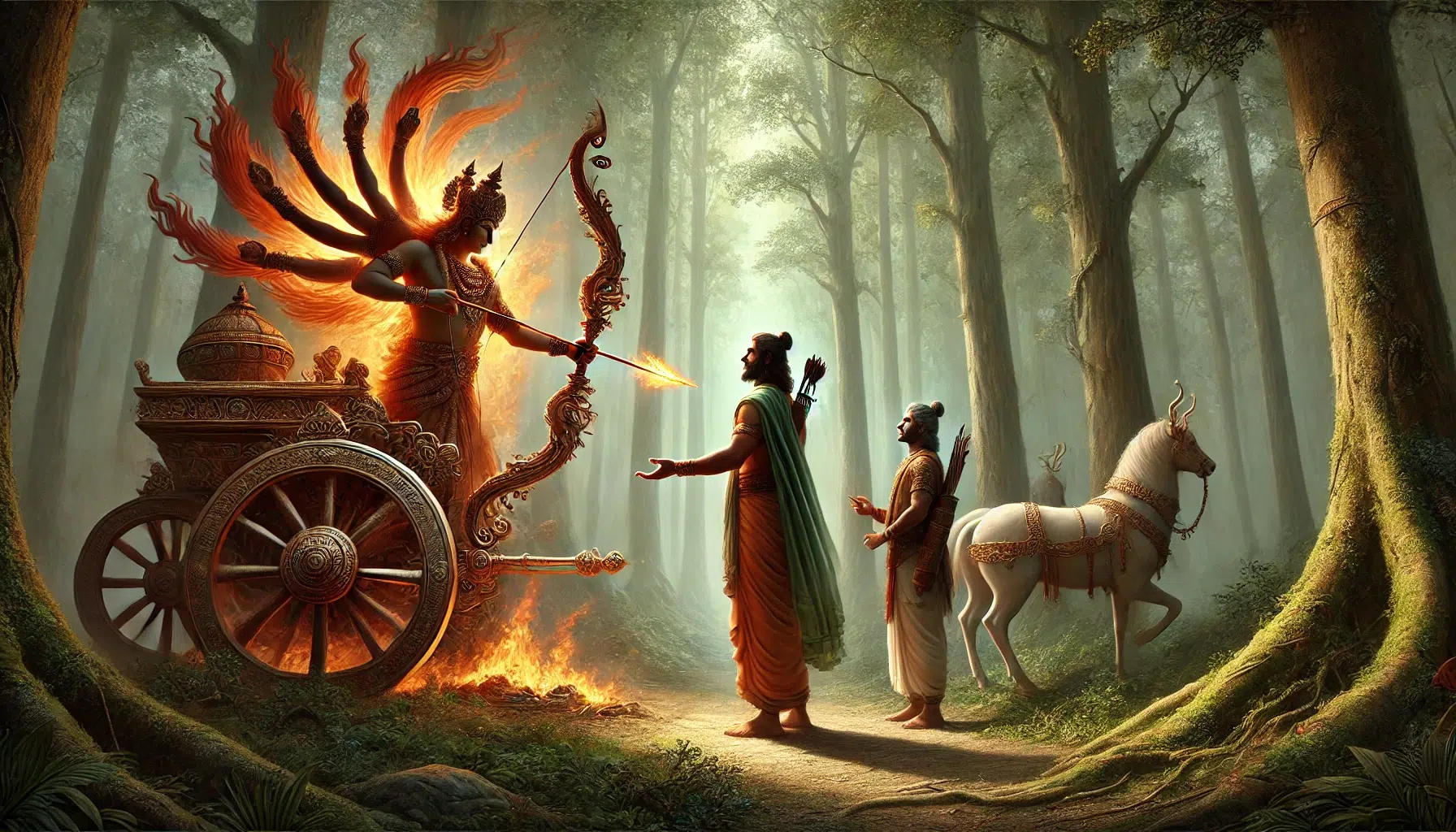
The Gandiva Bow
During the burning of the Khandava forest, the fire god Agni seeks Arjuna’s help. With Krishna beside him, Arjuna defends Agni from powerful enemies.
In return, Agni gives him the Gandiva, a divine bow, along with an endless quiver of arrows and a celestial chariot.
From this moment, Arjuna’s power increases dramatically.
The Pashupatastra Weapon
Still seeking greater strength, Arjuna performs intense penance to please Lord Shiva.
Shiva appears in disguise and tests him in combat. When Arjuna proves his skill and humility, Shiva reveals himself and grants him the Pashupatastra, one of the most destructive celestial weapons in mythology.
These years transform Arjuna.
Exile strips him of his kingdom, but it strengthens his resolve. By the time the Pandavas complete their year in disguise in the kingdom of Virata, Arjuna is no longer just a gifted archer.
He is armed with divine power and prepared for war.
The Kurukshetra War
The Kurukshetra War is the defining conflict of the Mahabharata. For Arjuna, it is not just a battle. It is a test of duty, loyalty, and conscience.
As the armies gather, Arjuna asks Krishna to place his chariot between the two sides. There he sees teachers, cousins, friends, and elders standing ready to fight.
His resolve breaks.
He lowers the Gandiva and refuses to fight.
This moment leads to the teachings of the Bhagavad Gita, where Krishna reminds him of his duty as a warrior and the deeper meaning of action without attachment.
With renewed clarity, Arjuna returns to the battlefield.

Arjuna’s Greatest Battles
Once committed, Arjuna becomes one of the most decisive forces in the war.
He faces Bhishma, the nearly invincible commander of the Kauravas. Guided by Krishna, Arjuna overwhelms him with arrows, bringing him down without dishonour.
He later confronts Karna, his greatest rival and an archer equal in skill. During their final duel, Karna’s chariot wheel sinks into the ground. At Krishna’s urging, Arjuna strikes the fatal blow. The balance of the war shifts.
Another turning point comes after the death of Arjuna’s son, Abhimanyu. Grief turns to fury. Arjuna vows to kill Jayadratha before sunset the next day. Against overwhelming odds, he fulfills his vow, restoring morale to the Pandava army.
Throughout the war, Krishna remains at his side. Not as a warrior, but as a guide. Strategy, restraint, timing — each decision is shaped by divine counsel.
The Cost of Victory
The Pandavas ultimately win the war and reclaim their kingdom.
But the victory is devastating.
Bhishma, Drona, Karna, Abhimanyu, and countless warriors fall. The battlefield is left in ruin. Yudhishthira takes the throne of Hastinapura, yet the triumph feels heavy.
For Arjuna, the war confirms both his power and his humanity. He fights for justice, but he carries the weight of loss.
The Kurukshetra War does not glorify violence. It reveals the cost of duty.
The Bhagavad Gita: Arjuna and Krishna
On the battlefield of Kurukshetra, just before the war begins, Arjuna breaks.
He sees teachers, cousins, friends, and elders standing on both sides. His hands shake. He questions the meaning of victory if it requires killing those he loves.
He lowers the Gandiva.
In that moment, Krishna speaks.
The dialogue that follows becomes the Bhagavad Gita, one of the most influential spiritual texts in history.
Krishna does not simply tell Arjuna to fight. He challenges his understanding of life, duty, and identity.
He teaches that the soul is eternal and cannot be destroyed. Death is a change of form, not an end.
He teaches:
- Dharma – the responsibility to act according to one’s role in the world
- Karma yoga – action without attachment to outcomes
- Bhakti – devotion and surrender to the divine
Arjuna’s struggle is not weakness. It is human doubt.
Krishna reminds him that avoiding duty out of fear does not bring peace. Clarity comes from acting with purpose, not from escaping conflict.
By the end of the dialogue, Arjuna does not become emotionless. He becomes resolved.
He lifts his bow again, not out of anger, but with understanding.
The Bhagavad Gita transforms him from a warrior fighting for victory into a warrior fighting with awareness.
Arjuna After the War
When the war ends, the Pandavas reclaim Hastinapura.
The victory is costly. The battlefield is silent. Friends and enemies alike have fallen.
Yudhishthira becomes king. Arjuna stands beside him, no longer defined only by skill, but by experience.
Ruling proves different from war.
The kingdom must be rebuilt. Families mourn. Fields lie empty. Trust must be restored.
Arjuna supports his brothers in restoring order and stability. He uses both diplomacy and strength when needed. The lessons of duty and restraint guide him.
Over time, the Pandavas withdraw from power and begin their final journey toward the Himalayas. One by one, they fall.
Arjuna’s life ends not in battle, but in reflection.
He is remembered not only as the greatest archer of his age, but as the warrior who questioned war and sought truth before action.
Arjuna’s Legacy and Why He Still Matters
Arjuna is remembered as one of the greatest warriors in the Mahabharata. His mastery of the Gandiva bow and his command of celestial weapons make him legendary.
But skill alone does not define his legacy.
Arjuna is the warrior who hesitated.
He questioned war, doubting himself. He struggled with the weight of duty. That moment of hesitation is what makes him human.
Through his dialogue with Krishna, he learns that action guided by clarity is stronger than action driven by fear. He fights not for glory, but for responsibility.
His story continues to resonate because it reflects a universal conflict: how to act when duty feels painful.
Arjuna represents discipline, courage, and reflection. He shows that strength is not the absence of doubt. It is the ability to move forward despite it.
Centuries later, his story remains a guide for anyone facing difficult choices.
He is not only the greatest archer of his age.
He is the warrior who sought understanding before drawing his bow.






